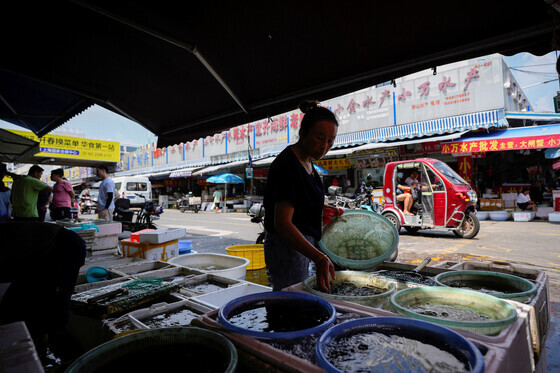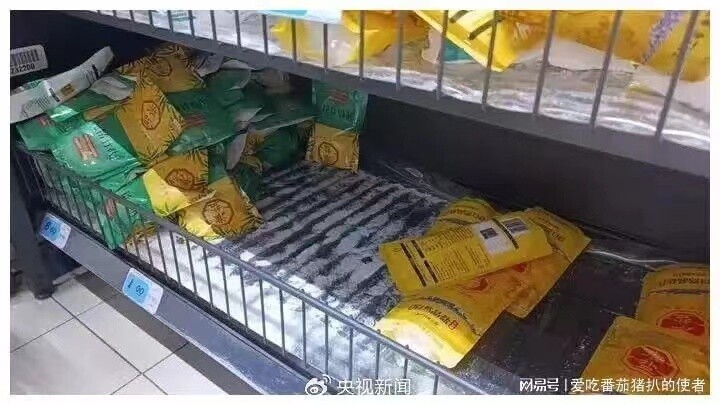hankyoreh
Links to other country sites 다른 나라 사이트 링크
China’s ire over Fukushima dumping takes shape in salt stockpiling, boycotts of Japanese cosmetics

“There’s no way to know what salt restaurants use when I eat out, but I still bought some the other day, so I won’t have to worry about what I eat at home.”
Liu, a 37-year-old living in China’s Shandong Province bought 5 kilograms (11 pounds) of salt at a supermarket on Friday, the day after Japan began discharging radioactively contaminated water from the Fukushima Daiichi nuclear plant into the ocean.
Though he doesn’t think that buying salt makes much of a difference, Liu said that seeing his relatives and friends stockpiling salt made him feel like he should too.
Liu has been paying close attention to the recent Fukushima wastewater dumping. Not only does he read newspaper articles and watch news broadcasts, but he’s also been closely following videos on Douyin, the Chinese counterpart of TikTok, as well as Korean news.
“I love sashimi, but I will never eat Japanese food again,” Liu told the Hankyoreh over the phone. “The Japanese government needs to know what it’s done wrong.”
The Chinese government suspended all imports of Japanese seafood on Thursday after Japan began discharging the contaminated water into the ocean. Since then, locals have been boycotting Japanese products and canceling travel plans.
In addition to stockpiling salt and cutting seafood out of their diets, people are boycotting Japanese cosmetics and canceling vacations to Japan.
Wang, a 35-year-old from Liaoning, China, is one of the few Chinese people who hasn’t bought salt since Japan began flushing the polluted water into the ocean. But even they recently received calls from their grandmother and mother-in-law concerning salt.
“My grandmother bought 5 kg of salt, while my mother-in-law bought 10 kg. They encouraged me to buy some as well,” Wang told the Hankyoreh. “They say that the discharge of polluted water will go on for 30 years. It isn’t as if I will be able to live off stockpiled salt for that long, so I’m not going to buy it in bulk.

However, they expressed their resolve to not eat seafood for the time being. “I don’t know how long it will last, but I’m going to go seafood-free for at least six months,” Wang said.
Japanese restaurants in Beijing are replacing Japanese seafood with seafood from Russia and other countries.
“Since the discharge of contaminated water has been a long time coming, many Japanese restaurants stopped using Japanese ingredients early on,” the Hongxing News reported, “and have already replaced them with Russian, Korean, and Southeast Asian products.”
Some locals are also slowly starting to boycott Japanese cosmetics. A list of more than 30 Japanese cosmetics brands along with alternatives has been making the rounds on the Chinese internet.
The state-run Global Times reported that a 35-year-old surnamed Huang, a loyal Japanese cosmetics buyer, opted to buy European products instead of Japanese ones after hearing about the ocean discharge.
Japanese cosmetics have held the top spot in China’s market share since 2019, but they began to decline in May 2023, with imports dropping 30% in July compared to the same period a year earlier.
People are also canceling group tours to Japan. Chinese online travel platforms such as Trip.com, Tongcheng Travel, and Tuniu Co. have relegated Japan travel products from prominent positions, and some customers are canceling their reservations altogether.
As public sentiment towards Japan has soured in China, the Japanese Embassy in Beijing issued back-to-back advisories to Japanese nationals in the country on its website on Thursday and Friday, the day the ocean discharge began, recommending that travelers take “extra precautions as contingencies cannot be ruled out” and to “not speak too loudly in Japanese.”
Japan’s Komeito party, the junior partner in the coalition government, announced that its leader, Natsuo Yamaguchi, would postpone his visit to China, which was scheduled for Monday through Wednesday, Japanese media reported.
China reportedly informed the Komeito on Saturday afternoon that “the timing is not appropriate considering the current situation of Japan-China relations.”
Yamaguchi had been scheduled to visit China for the first time in four years to deliver a letter of goodwill from Prime Minister Fumio Kishida.
By Choi Hyun-june, Beijing correspondent
Please direct questions or comments to [english@hani.co.kr]

Editorial・opinion
![[Editorial] Perilous stakes of Trump’s rhetoric around US troop pullout from Korea [Editorial] Perilous stakes of Trump’s rhetoric around US troop pullout from Korea](https://flexible.img.hani.co.kr/flexible/normal/500/300/imgdb/original/2024/0509/221715238827911.jpg) [Editorial] Perilous stakes of Trump’s rhetoric around US troop pullout from Korea
[Editorial] Perilous stakes of Trump’s rhetoric around US troop pullout from Korea![[Guest essay] Preventing Korean Peninsula from becoming front line of new cold war [Guest essay] Preventing Korean Peninsula from becoming front line of new cold war](https://flexible.img.hani.co.kr/flexible/normal/500/300/imgdb/original/2024/0507/7217150679227807.jpg) [Guest essay] Preventing Korean Peninsula from becoming front line of new cold war
[Guest essay] Preventing Korean Peninsula from becoming front line of new cold war- [Column] The state is back — but is it in business?
- [Column] Life on our Trisolaris
- [Editorial] Penalties for airing allegations against Korea’s first lady endanger free press
- [Editorial] Yoon must halt procurement of SM-3 interceptor missiles
- [Guest essay] Maybe Korea’s rapid population decline is an opportunity, not a crisis
- [Column] Can Yoon steer diplomacy with Russia, China back on track?
- [Column] Season 2 of special prosecutor probe may be coming to Korea soon
- [Column] Park Geun-hye déjà vu in Yoon Suk-yeol
Most viewed articles
- 1‘Free Palestine!’: Anti-war protest wave comes to Korean campuses
- 2[Editorial] Perilous stakes of Trump’s rhetoric around US troop pullout from Korea
- 3Behind-the-times gender change regulations leave trans Koreans in the lurch
- 4Nuclear South Korea? The hidden implication of hints at US troop withdrawal
- 5[Photo] ‘End the genocide in Gaza’: Students in Korea join global anti-war protest wave
- 6Korean president’s jailed mother-in-law approved for parole
- 760% of young Koreans see no need to have kids after marriage
- 8In Yoon’s Korea, a government ‘of, by and for prosecutors,’ says civic group
- 9[Guest essay] Preventing Korean Peninsula from becoming front line of new cold war
- 10Yoon’s revival of civil affairs senior secretary criticized as shield against judicial scrutiny